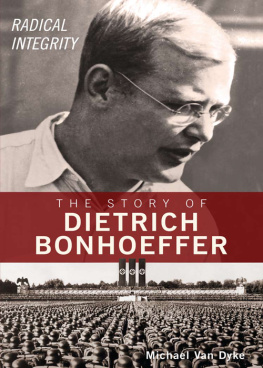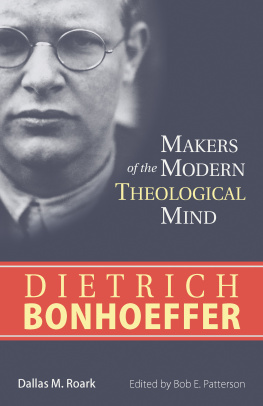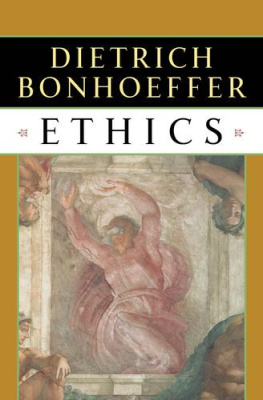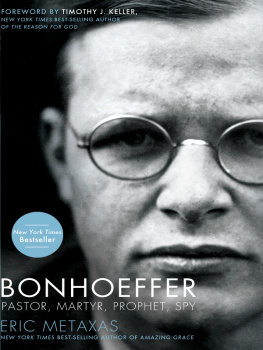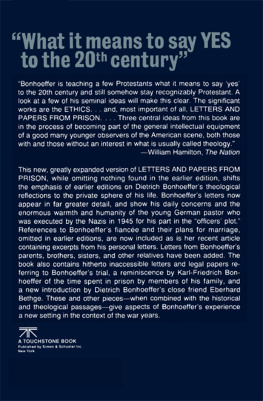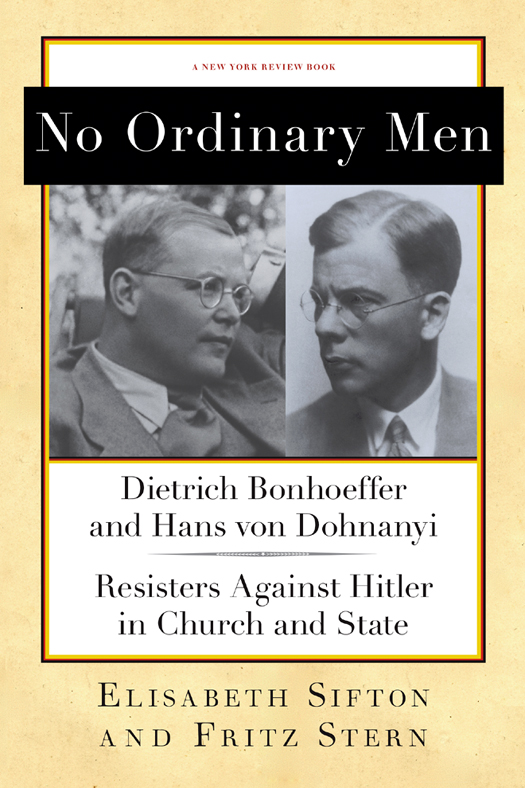THIS IS A NEW YORK REVIEW BOOK
NO ORDINARY MEN
Copyright 2013 by Elisabeth Sifton and Fritz Stern
Copyright 2013 by NYREV, Inc.
All rights reserved, which includes the right to reproduce this book or portions thereof in any form whatsoever.
Published by The New York Review of Books, 435 Hudson Street, Suite 300, New York NY 10014
www.nyrb.com
Jacket design: Evan Johnston
Cover photos: Dietrich Bonhoeffer in London, 1939 (bpk, Berlin / Rotraut Forberg / Art Resource, NY)
Hans von Dohnanyi, 1940 (Art Resource, NY)
Library of Congress Cataloging-in-Publication Data
Sifton, Elisabeth, author.
No ordinary men : Dietrich Bonhoeffer and Hans von Dohnanyi, resisters against Hitler in church and state / by Elisabeth Sifton and Fritz Stern.
pages cm. (New York Review Books collections)
Includes bibliographical references.
ISBN 978-1-59017-681-8 (alk. paper)
1. Bonhoeffer, Dietrich, 1906-1945. 2. Dohnanyi, Hans von, 1902-1945. 3. Anti-Nazi movementGermanyBiography. 4. Government, Resistance toGermanyHistory20th century. 5. Church and stateGermanyHistory20th century. 6. TheologiansGermanyBiography. 7. LawyersGermanyBiography. I. Stern, Fritz Richard, 1926- author. II. Title.
BX4827.B57S57 2013
943.0860922dc23
2013015555
eISBN: 978-1-59017-702-0
For a complete list of books in the NYRB Classics series, visit www.nyrb.com or write to:
Catalog Requests, NYRB, 435 Hudson Street, New York, NY 10014
v3.1
Contents
To the memory of our parents
Preface
HITLERS THIRD REICH was the twentieth centurys most popular tyranny: millions of jubilant Germans cheered while tens of thousands, then millions, and eventually much of the world suffered. His regime could boast of economic success rapidly achieved, of German power regained and German prestige restoredbut then squandered in satanic barbarism. The Nazis public pageantry always had terror in the wings, and we must understand the cunning with which they cajoled people into supporting their actions while at the same time intimidating them through terror, torture, and murder; it is an object lesson in the use of power for evil ends.
To oppose such a regime was rare and fraught with danger. To do so in order to protect the sanctity of law and of faith was rarer still. We are concerned in this book with the lives and actions of two admirable men who from the start of the Third Reich did their utmost, each in his own way, to oppose Nazi outrages, and who then conspired to overthrow the tyrant. One, Hans von Dohnanyi, a lawyer, is scarcely known in the United States; the other, his brother-in-law Dietrich Bonhoeffer, a pastor, has become very well known; there is also ChristineDietrichs sister and Hanss wife.
On April 5, 1943, the Gestapo arrested all three: the brave and gifted lawyer who as an important member of the armys counterintelligence section had become a major figure in the civilian branch of the conspiracy against Hitler; the forceful, dedicated young pastor who for a decade had been battling Nazi racial thought and action in Germanys Protestant churches, which were largely bereft of principled opponents to Hitlers godless tyranny; and the woman who all along assisted her husband and brother. The three were united in a bond of decency and courage that was itself the rock on which resistance to tyranny could be built. Christine was released within the month, but the men were never freed. After two years in jail under terrible conditions and subjected to humiliating interrogations, Bonhoeffer and Dohnanyi were murdered, on Hitlers express orders, in April 1945, just weeks before the Fhrers suicide and Germanys surrender.
After the war, Eberhard Bethge, a friend and student of Bonhoeffers who became his literary executor, published some of the letters Bonhoeffer had written from jail, mostly letters to Bethge about the theological and ethical thoughts he had pondered while behind bars. When Letters and Papers from Prison appeared in 1951, it aroused great interest, and Bethge began work on a biography, which was published in 1967. A stream of commentary, analysis, dramatic presentations, films, and new material by and about Bonhoeffer has flowed on ever since. Dohnanyi appears in some of these sources, as do other family members, but Bonhoeffer is of course at the center.
At the same time, scholars and writers have closely scrutinized the historical record of Germany during the Nazi period: a large number of Holocaust studies treat that subject down to every last numbing murderous detail, while a smaller, less noticed, but respectable body of literature focuses on the German resistancea subject that was scarcely thought to have existed when Letters and Papers from Prison first came out. What emerges are two almost separate worlds, but the significant links between them have gone largely unobserved, and they are dramatically visible in the story of Dohnanyi, Bonhoeffer, and their allies. For among those opposed from the start to Hitlers ruleappalled by its violations of law, precedent, and decencyit was increasing outrage about the Nazi atrocities against Jews that became a major motive for the decision to resist Hitler and ultimately to try to remove him. The conspirators knew unspeakable truths about what was happening in Germany that many people not only in Germany but also in the outside world did not know and did not want to know. And they were ready and willing to take action against the regime.
These resisters were not necessarily friends of the Jews. It is doubtful that many of them were. Some of them may have had residues of Christian prejudice, or feelings that ranged from reserve to repulsion about Jews generally and about Germanys prosperous, highly ambitious Jews in particular; such feelings ran strong among some Jews themselves and many gentiles elsewhere in the West as well. However, to see the state discriminate against Jews, to see the beginnings of enforced pariahdom and worsethis prompted sympathetic support for Jews among many members of the Bonhoeffer circle. They understood instinctively that Jews were being robbed of their dignity, then of their very existence in a barbaric outrage that ended in a catastrophe not seen in Europe since the Thirty Years War. For many, the organized bestiality was also an outrage against God, one that would be a burden of guilt for their countrymen forever.
In any account of Bonhoeffer and Dohnanyi, we should remember to keep two general points in mind. The members of the Bonhoeffer familyDietrichs father, Dr. Karl Bonhoeffer, Germanys preeminent psychiatrist; his mother, Paula (ne von Hase), daughter and granddaughter of aristocrats and well-known clerics; Dietrich; and his siblingswere remarkable examples of devotion and closeness to one another; they embodied certain virtues that they rarely mentioned but sturdily demonstrated: decency and hard work, reasonable selflessness, responsibility for others, and unexcelled courage. And throughout the upheavals of 19141945, the Bonhoeffers responded to the horrors convulsing Germany and Europe in a manner that was radically and honorably different from that chosen by the vast majority of Germans. Most members of the high professional elite to which they belonged either succumbed to the temptation of National Socialismperhaps regretting some excesses, perhaps impressed by the Nazis pseudo-religious rhetoricor clung to the illusion that in the Third Reich one could be unpolitical, playing it safe or going into inner emigration.


